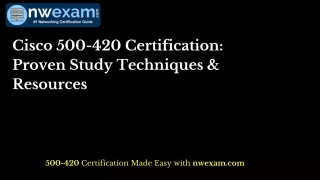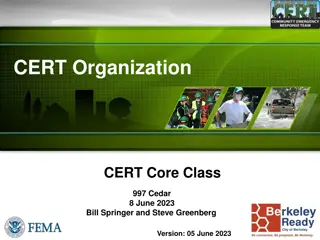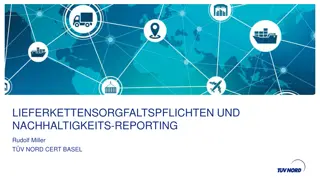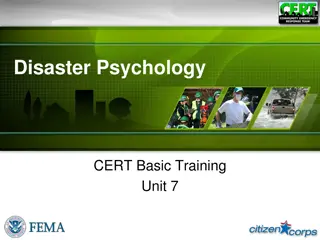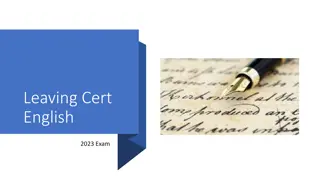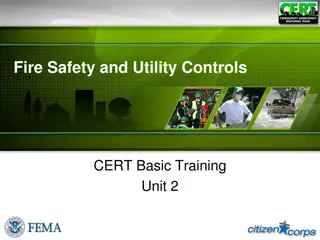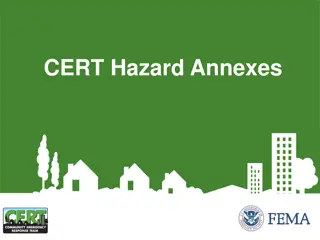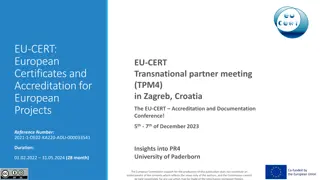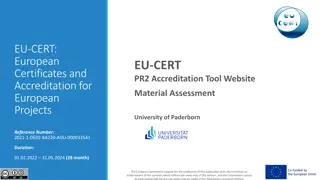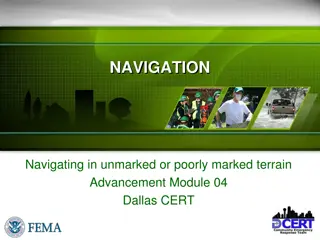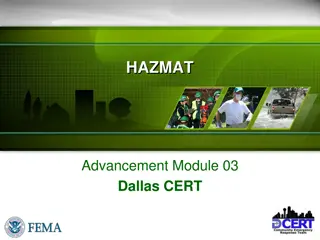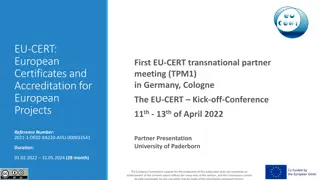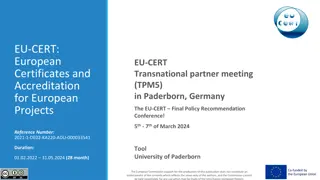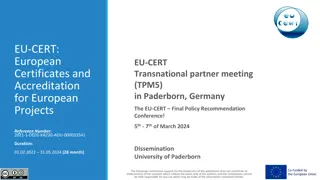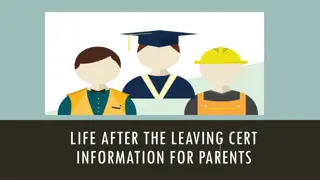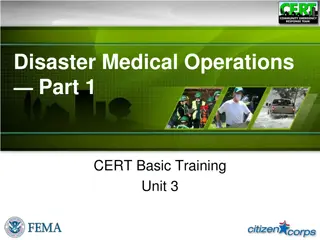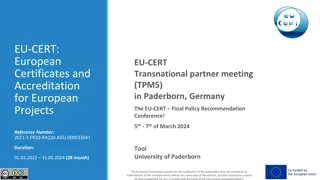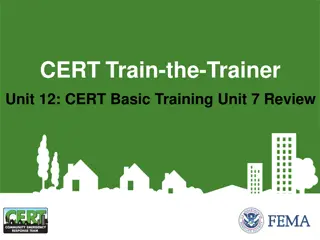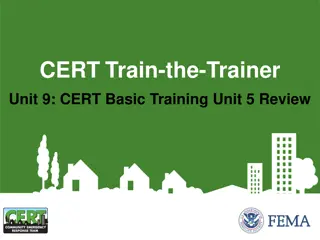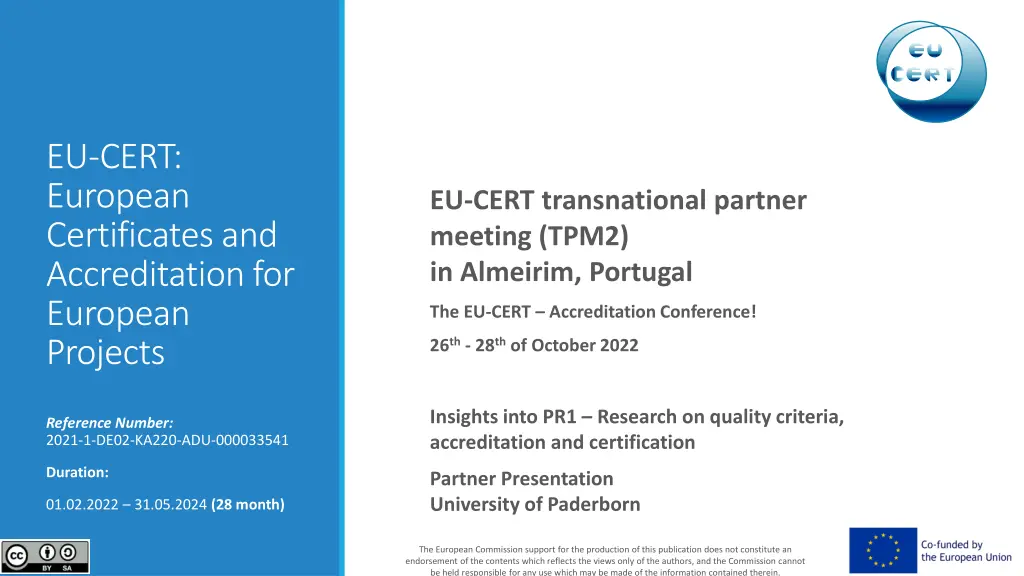
European Project EU-CERT: Quality Accreditation & Certification Insights
Explore the European project EU-CERT focusing on research, quality criteria, and certification processes. Get insights from the transnational partner meeting in Portugal. Discover the project results and upcoming activities related to accreditation and certification in Europe.
Download Presentation

Please find below an Image/Link to download the presentation.
The content on the website is provided AS IS for your information and personal use only. It may not be sold, licensed, or shared on other websites without obtaining consent from the author. If you encounter any issues during the download, it is possible that the publisher has removed the file from their server.
You are allowed to download the files provided on this website for personal or commercial use, subject to the condition that they are used lawfully. All files are the property of their respective owners.
The content on the website is provided AS IS for your information and personal use only. It may not be sold, licensed, or shared on other websites without obtaining consent from the author.
E N D
Presentation Transcript
EU-CERT: European Certificates and Accreditation for European Projects EU-CERT transnational partner meeting (TPM2) in Almeirim, Portugal The EU-CERT Accreditation Conference! 26th - 28th of October 2022 Insights into PR1 Research on quality criteria, accreditation and certification Reference Number: 2021-1-DE02-KA220-ADU-000033541 Duration: Partner Presentation University of Paderborn 01.02.2022 31.05.2024 (28 month) The European Commission support for the production of this publication does not constitute an endorsement of the contents which reflects the views only of the authors, and the Commission cannot be held responsible for any use which may be made of the information contained therein.
Meeting Agenda The European Commission support for the production of this publication does not constitute an endorsement of the contents which reflects the views only of the authors, and the Commission cannot be held responsible for any use which may be made of the information contained therein.
Meeting Agenda Meeting Agenda Thursday Thursday, 27th of , 27th of October October The European Commission support for the production of this publication does not constitute an endorsement of the contents which reflects the views only of the authors, and the Commission cannot be held responsible for any use which may be made of the information contained therein.
About the Project About the Project Results (PR) 1 Results (PR) 1 The European Commission support for the production of this publication does not constitute an endorsement of the contents which reflects the views only of the authors, and the Commission cannot be held responsible for any use which may be made of the information contained therein.
Project Project Results Results Project Results Starting period End of period Activity Title Leading Organisation Project Result 1 2022-02 2022- 10 EU-CERT - Research on Quality criteria, Accreditation and Certificate Structures University of Paderborn Germany 2022-02 2023-03 EU-CERT - Concept Design for Accredition and Certification Processes STANDO - Cyprus Project Result 2 Project Result 3 2022-05 2023-07 EU-CERT - Accreditation Website and Data-base Design and Programming Ingenious Knowledge GmbH - Germany Project Result 4 2022-07 2023-07 EU-CERT - Accreditation Handbook University of Paderborn - Germany Project Result 5 2022-03 2023-11 EU-CERT - Accreditation and Certification - Roll-out to adult education providers Esquare - France Project Result 6 2022-02 2024-02 EU-CERT - Policy paper Associa o Rede de Universidades da Terceira Idade - Portugal Project Result 7 2202-02 2024-02 EU-CERT - Layman s report TIR Consulting Group j.d.o.o - Croatia The European Commission support for the production of this publication does not constitute an endorsement of the contents which reflects the views only of the authors, and the Commission cannot be held responsible for any use which may be made of the information contained therein.
Project Project Result Result1 1 EU-CERT - RESEARCH ON QUALITY CRITERIA, ACCREDITATION AND CERTIFICATE STRUCTURES (LEADING ORGA: UNIVERSITY OF PADERBORN) The European Commission support for the production of this publication does not constitute an endorsement of the contents which reflects the views only of the authors, and the Commission cannot be held responsible for any use which may be made of the information contained therein.
Starting Starting position position Actually we have the following Problem: We complain about the intransparency and the lack of quality of the results of the European adult education programs. Moreover, they cannot be transferred into the daily practice of adult education. Solution: EU-CERT develops European standards for project accreditation in adult education. The main objective/ aim of the EU-CERT project is to design and implement a set of European criteria for ERASMUS+ project accreditation and to develop a stable accreditation structure that will continue to function after the EU-CERT project is completed. The European Commission support for the production of this publication does not constitute an endorsement of the contents which reflects the views only of the authors, and the Commission cannot be held responsible for any use which may be made of the information contained therein.
Project Project Result Result1 1 Mixed Mixed- -Methods Design of Methods Design of the theResearch Research Project result 1 (PR1) - EU- CERT - Research on Quality criteria, Accreditation and Certificate Structures" comes with Quantitative Research: Qualitative Research: (III) broad questionnaire on quality assurance with regard to ERASMUS+ and necessary quality criteria as well as exisiting certification elements (I) desktop research in each partner country and (II) combines this with 5 expert interviews in each country This is a crucial basis for the concept design in PR2 and the programming in PR3 The European Commission support for the production of this publication does not constitute an endorsement of the contents which reflects the views only of the authors, and the Commission cannot be held responsible for any use which may be made of the information contained therein.
Project Project Results Results1 1 - -Qualitative Research Qualitative Research Document has to be translated in each partner language. English version available The European Commission support for the production of this publication does not constitute an endorsement of the contents which reflects the views only of the authors, and the Commission cannot be held responsible for any use which may be made of the information contained therein.
Project Project Results Results1 1 - -Qualitative Research Qualitative Research Interview guideline has to be translated in each partner language. English version available The European Commission support for the production of this publication does not constitute an endorsement of the contents which reflects the views only of the authors, and the Commission cannot be held responsible for any use which may be made of the information contained therein.
Project Project Results Results1 1 Quantitative Research Quantitative Research Quantitative questionnaire has to be translated in each partner language. English version available The European Commission support for the production of this publication does not constitute an endorsement of the contents which reflects the views only of the authors, and the Commission cannot be held responsible for any use which may be made of the information contained therein.
Results of PR1 Results of PR1 INSIGHTS FROM THE UNIVERSITY OF PADERBORN, GERMANY The European Commission support for the production of this publication does not constitute an endorsement of the contents which reflects the views only of the authors, and the Commission cannot be held responsible for any use which may be made of the information contained therein.
I Desktop Research I Desktop Research Qualitative Research Qualitative Research Cumulative results of the qualitative expert interviews: The German Accreditation Body/ Deutsche Akkreditierungsstelle, DAkkS for short, is the "national accreditation authority of the Federal Republic of Germany" (DAKKS o. D.-a) and a fundamental elementary component of the German quality infrastructure. It is responsible for the accreditation of organisations that carry out conformity assessments, such as laboratories, inspection and certification bodies in various fields of work (cf. ibid.; DAKKS o. D.-i) The European Commission support for the production of this publication does not constitute an endorsement of the contents which reflects the views only of the authors, and the Commission cannot be held responsible for any use which may be made of the information contained therein.
I Desktop Research I Desktop Research Qualitative Research Qualitative Research If an organisation is accredited, this confirms that the organisation works in accordance with internationally valid standards, legal foundations and relevant rules and has the competence to professionally test and certify certain services, processes and products. Accreditation does not refer to an entire organisation, but to a specific area within an organisation, i.e. "[t]he accreditation is granted for concrete and detailed described conformity assessment activities" (DAKKS o. D.-c). The European Commission support for the production of this publication does not constitute an endorsement of the contents which reflects the views only of the authors, and the Commission cannot be held responsible for any use which may be made of the information contained therein.
I Desktop Research I Desktop Research Qualitative Research Qualitative Research The accreditation granted is valid either for an unlimited period or for a limited period. The European Commission support for the production of this publication does not constitute an endorsement of the contents which reflects the views only of the authors, and the Commission cannot be held responsible for any use which may be made of the information contained therein.
Accreditation process of the Accreditation process of the DAkkS DAkkS Basics Changes & Modification Applications Possible Step! Examination of documents (& on-site assessment) Surveillance/control/ Reaccreditation Accreditation decision (cf. DAKKS o. D.-d) The European Commission support for the production of this publication does not constitute an endorsement of the contents which reflects the views only of the authors, and the Commission cannot be held responsible for any use which may be made of the information contained therein.
I Desktop Research I Desktop Research Qualitative Research Qualitative Research Focus on: Certification of continuing vocational training measures (CET) Presentation of selected models for certification: The requirements that providers of CET measures must meet in order to be certified by a competent body are derived from 178 SGB III in conjunction with 2 AZAV and the recommendations of the AZAV Advisory Board (2021, p. 6ff.). The European Commission support for the production of this publication does not constitute an endorsement of the contents which reflects the views only of the authors, and the Commission cannot be held responsible for any use which may be made of the information contained therein.
I Selected I Selected certification certificationbodies bodies CERTQUA (German Industry Association for the Promotion and Certification of Quality Assurance Systems in Vocational Education and Training) was founded in 1994 jointly by leading associations of German industry and the industry association Wuppertaler Kreis e.V. (cf. CERTQUA o. D-b). CERTQUA is active nationally and internationally as a certification body and supports, for example, educational organisations, schools and universities. it carries out certifications of quality management systems according to the DIN EN ISO 9001 standard as well as the DIN ISO 29990 and DIN ISO 21001 education standards and is accredited for this by the DAkkS (cf. CERTQUA o. D.-a; CERTQUA o. D.-b). is accredited by the DAkkS as a competent body according to SGB III in conjunction with AZAV and may therefore approve providers and measures of employment promotion. service standards in the education sector according to DIN ISO 29993 (cf. CERTQUA o. D.-c). (cf. CERTQUA n.d.- b) The European Commission support for the production of this publication does not constitute an endorsement of the contents which reflects the views only of the authors, and the Commission cannot be held responsible for any use which may be made of the information contained therein.
II Selected II Selected certification certificationbodies bodies T V NORD CERT is the certification company of T V NORD AG (cf.T V NORD AG o. D.-a). It evaluates and certifies through certification that certain specifications or standards are met (cf. ibid.). In the field of education, the scope of services provided by T V NORD CERT includes certification in accordance with DIN ISO 21001, which is accredited by the DAkkS, as well as the approval of providers and and measures in accordance with SGB III in conjunction with AZAV as an expert body (cf. T V NORD AG n.d.-b). In addition, T V NORD CERT also certifies educational services in accordance with DIN ISO 29993 (cf. ibid.). With one of the aforementioned certifications by T V NORD CERT, "companies can [signal] to their potential customers that [their] educational services meet internationally recognised standards. Furthermore, the standards communicate a neutral, renowned proof of quality in the competitive environment and assure your company of a quality promise" (ibid.). (cf. T V NORD AG n.d.-b) The European Commission support for the production of this publication does not constitute an endorsement of the contents which reflects the views only of the authors, and the Commission cannot be held responsible for any use which may be made of the information contained therein.
Results of the qualitative Results of the qualitative expert expert interviews interviews SOME INSIGHTS The European Commission support for the production of this publication does not constitute an endorsement of the contents which reflects the views only of the authors, and the Commission cannot be held responsible for any use which may be made of the information contained therein.
Results of the qualitative expert Results of the qualitative expert interviews interviews Summary: I Quality criteria of the teaching processes: Transparency of objectives, content and forms of work, Appropriate influence of learners on content, objectives and forms of work, reflection on learning process and success, space, time and technology for practical practice and application, opportunities for self-organised learning, learning support and learning guidance The European Commission support for the production of this publication does not constitute an endorsement of the contents which reflects the views only of the authors, and the Commission cannot be held responsible for any use which may be made of the information contained therein.
Results of the qualitative expert Results of the qualitative expert interviews interviews Summary: II Quality criteria of Design of measures: The contents, methods, materials, the teaching of the contents and the organisation of the lessons must be designed in such a way that successful participation can be expected (cf. 179 Para. 1 No. 1 SGB III). The objectives, duration and content of the measure must be appropriate to the target group (cf. 3 Para. 1 Sentence 1 No. 1 AZAV). The European Commission support for the production of this publication does not constitute an endorsement of the contents which reflects the views only of the authors, and the Commission cannot be held responsible for any use which may be made of the information contained therein.
Results of the qualitative expert Results of the qualitative expert interviews interviews Summary: III Quality criteria for the learning environment and infrastructure: Regular review of the learning venue, equipment and working conditions based on specific criteria. Ensuring the availability of media (if necessary machines, tools, etc.) and checking their usability. Some Insights The European Commission support for the production of this publication does not constitute an endorsement of the contents which reflects the views only of the authors, and the Commission cannot be held responsible for any use which may be made of the information contained therein.
Results of the qualitative expert Results of the qualitative expert interviews interviews Summary: IV Quality criteria: Qualification of Staff (cf. 178 No. 3 SGB III) Proof can be provided by: Personal details, education and further training, professional career and practical work experience in the field of specialization of management, teaching and technical staff (cf. 2 Para. 3 AZAV) Pedagogical aptitude and methodological-didactic competence of teaching and teaching and technical staff (cf. 2 Para. 3 AZAV) Teacher evaluations of participants (cf. 2 Para. 3 AZAV) The European Commission support for the production of this publication does not constitute an endorsement of the contents which reflects the views only of the authors, and the Commission cannot be held responsible for any use which may be made of the information contained therein.
Results of the Results of the quantitative Research quantitative Research SOME INSIGHTS The European Commission support for the production of this publication does not constitute an endorsement of the contents which reflects the views only of the authors, and the Commission cannot be held responsible for any use which may be made of the information contained therein.
Some Someinsights insightsin the quantitative in the quantitative research researchresults results Sample of 47 participants Target Sample: (higher) educational/vo cational sector Evaluation IBM SPSS Software "Dieses Foto" von Unbekannter Autor ist lizenziert gem CC BY-NC-ND The European Commission support for the production of this publication does not constitute an endorsement of the contents which reflects the views only of the authors, and the Commission cannot be held responsible for any use which may be made of the information contained therein.
Some Someinsights insightsin the quantitative in the quantitative research researchresults results Over 80% of respondents believe that Effective Basic Skills /Improvement Strategies are partially integrated into upgrading programmes. But: The criteria Contribution to the development of a European area of competences and qualifications, Inclusive approach of adult education / upgrading programmes and Support of general European values as well as common democratic values are considered to be integrated in the programme by only about 15% of the respondents. The European Commission support for the production of this publication does not constitute an endorsement of the contents which reflects the views only of the authors, and the Commission cannot be held responsible for any use which may be made of the information contained therein.
Some Someinsights insightsin the quantitative in the quantitative research researchresults results The criterion of strengthening quality through mobility as well as cross-border and international cooperation, in which the participants can participate, is considered important or very important by about 75% of the participants. The European Commission support for the production of this publication does not constitute an endorsement of the contents which reflects the views only of the authors, and the Commission cannot be held responsible for any use which may be made of the information contained therein.
Some Someinsights insightsin the quantitative in the quantitative research researchresults results 88.46% of the participants consider the criterion High competence of the adult teacher as important for programmes of upgrading training. This is particularly interesting in light of the fact that approx. 12% of the participants find that the criterion is not integrated into the programme. The European Commission support for the production of this publication does not constitute an endorsement of the contents which reflects the views only of the authors, and the Commission cannot be held responsible for any use which may be made of the information contained therein.
Further information in the PR1 report The European Commission support for the production of this publication does not constitute an endorsement of the contents which reflects the views only of the authors, and the Commission cannot be held responsible for any use which may be made of the information contained therein.
Reference Reference CERTURIA (2011): Retrieved from the Internet: https://www.certuria.de/?gclid=Cj0KCQjwqc6aBhC4ARIsAN06NmOhkUjKXityoXu_5LfI- RZ1lxIPjQX_rU44uUt1ZaHSqtNnGOvfJEgaAtcdEALw_wcB, access date: 03.10.2022. CERTQUA (2022): Retrieved from the Interne: https://www.certqua.de/web/de/index.php?gclid=Cj0KCQjwqc6aBhC4ARIsAN06NmMg7N9- LNGZ3V6FXvI9hPKBftJpKRAYZrHvgGxZc_IkA6Mxh94DjTYaArgUEALw_wcB, access date: 03.10.2022. DAkkS (2022): Retrieved from the Internet: https://www.dakks.de/de/home.html, access date: 01.10.2022. The European Commission support for the production of this publication does not constitute an endorsement of the contents which reflects the views only of the authors, and the Commission cannot be held responsible for any use which may be made of the information contained therein.
Universitt Paderborn Department Wirtschaftsp dagogik Lehrstuhl Wirtschaftsp dagogik II Warburger Str. 100 33098 Paderborn Prof. Dr. Marc Beutner Tel: Fax: E-Mail: +49 (0) 52 51 / 60 - 23 67 +49 (0) 52 51 / 60 - 35 63 marc.beutner@uni-paderborn.de http://www.upb.de/wipaed The European Commission support for the production of this publication does not constitute an endorsement of the contents which reflects the views only of the authors, and the Commission cannot be held responsible for any use which may be made of the information contained therein.

